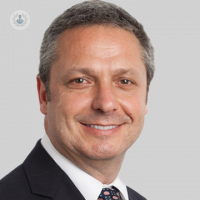Tooth whitening - what actually works?
Written by:There’s a dazzling array of tooth whitening treatments on the market today – toothpastes, whitening strips, even whitening gel to leave on your teeth. But for most people the effects can be a little disappointing and don’t last very long. For long-term results, professional tooth whitening is another option – but what is it, what does it involve, and who can carry it out? We asked top restorative and cosmetic dentist Dr David Bloom, who practises at a number of clinics in central London.

What is professional tooth whitening?
Professional tooth whitening involves a dental care professional using a hydrogen peroxide based product to lighten the colour of your teeth.
Legally, only dentists can prescribe tooth whitening, and only dentists or dental care professionals (acting under the prescription of a dentist) can complete tooth whitening.
The most popular and common form of whitening is to use a custom-made whitening tray to hold the peroxide based gel against the teeth for a few hours or overnight.
Power whitening can be undertaken but with the concentrations of peroxide we are now legally allowed to use this will still involve wearing a custom tray, and it is unlikely to dramatically reduce the time the trays are worn for.
What makes this different from home whitening kits?
The hydrogen peroxide involved in professional tooth whitening is in a much stronger concentration than what is contained in “home” whitening kits.
Whitening tooth pastes will generally help reduce external stain build up but will not lighten teeth. The only possible exception to this is Colgate max white expert white as this does contain 0.1% hydrogen peroxide, but this is nowhere near the strength of the 6% hydrogen peroxide dentists will use.
Tooth whitening strips are now available from your dentist but will never contact all the tooth surface as intimately as a custom-made tray and so can never be as good.
Is the procedure painful?
It is not unusual to have some degree of sensitivity during the whitening process, but after teeth whitening the teeth should be no more sensitive than before. There are various ways to help manage this sensitivity, ranging from the concentrations and formulation of peroxide gel used to how often and how long the whitening is done, as well as using certain desensitising agents on the teeth, and even in the use of custom-made trays.
Are there any foods and drinks you should avoid during or after treatment?
We used to say that during treatment one should avoid food and drinks that would stain a white T-shirt. However, I am now happy that as long as these are not eaten or drunk for half an hour after treatment, saliva will have then produced a protective peddicle on the teeth and so this is no longer the case.
Teas, coffees, red wine and smoking will all hasten the discoloration of teeth.
What other ways should I take care of my teeth following treatment?
Tooth whitening will fade over time so you should be prepared to do a night’s whitening every 1-2 months.
Note that pre-existing porcelain restorations will not be made whiter with tooth whitening, and so if restorations have been completed before whitening you should be prepared to redo the restoration as after whitening they will no longer be the same shade as the new whiter teeth. However, as long as you plan on maintaining your tooth whitening treatments over time I am generally happy to match porcelain restorations to whitened teeth and be confident that the colour of the whitened teeth can be maintained.


